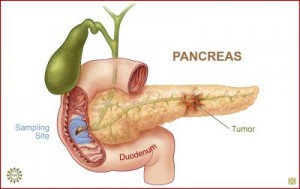Imagine this – it starts from deeper in the abdomen, inside the pancreas, an organ between the stomach and backbone, gradually hits a person at 60s with no sign or some digestive discomfort, pain in the abdomen, yellowish skin, and then unexplained weight loss. After that, it aggressively takes the person’s life. That is pancreatic cancer.
 Pancreatic cancer is one of the deadliest forms of all cancer. With current medical technology, the five-year survival rate is only six percent. The cases are apparently increasing, as about 45,000 people are expected to be diagnosed with pancreatic cancer in 2013; among them 38,000 people will die of the disease this year.
Pancreatic cancer is one of the deadliest forms of all cancer. With current medical technology, the five-year survival rate is only six percent. The cases are apparently increasing, as about 45,000 people are expected to be diagnosed with pancreatic cancer in 2013; among them 38,000 people will die of the disease this year.
To help raise awareness of this devastating disease among those who are unfamiliar with pancreatic cancer, let me use “The Rule of Three” to highlight pancreatic cancer prevention.
Rule #1: Never smoke, and live a healthy lifestyle.
Cigarette smoking is a well-established risk factor for pancreatic cancer. It’s also important to maintain a healthy lifestyle, eat more plant-based foods and less meat, stay physically active, and keep a healthy weight. Obesity has also been linked to pancreatic cancer.
Rule #2: Prevent and treat chronic pancreatitis.
Inflammation plays a role in developing pancreatic cancer, and chronic pancreatitis is a known risk factor. In addition, pancreatic cancer is more common among individuals with histories of cirrhosis (a chronic liver disease), diabetes, and previous surgery to the upper digestive tract. Pancreatic cancer may also be attributed to a pathogen for periodontal disease (named porphyromonas gingivalis).
Rule #3: Keep diabetes at the bay.
Type 2 diabetes is closely associated with pancreatic cancer, as a body of research reveals. As the population ages and the obesity epidemic continues, the incidence of diabetes is predicted to rise. People with diabetes are more likely to develop pancreatic cancer than those free of diabetes.
A final point
Still, as is true for other cancers, early detection is always important for combating the pancreatic cancer. This is particularly critical for those with a family history of this disease, because the risk can be doubled or tripled by familial pancreatic cancer.
In brief, pancreatic cancer is deadly, but you can lower your risk by not smoking, preventing pancreatitis and diabetes, and raising your awareness about the importance of living a healthy lifestyle.
Image credit: by medicineworld.org
